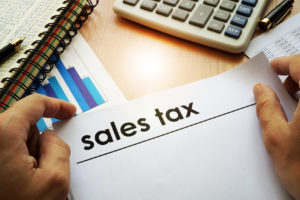2018 has seen some sweeping changes to tax legislation in both the country and in the State of New Jersey. Some of these changes are due to tax reduction initiatives started by former Governor Chris Christie, while others are recent reforms enacted by Congress and President Trump. Below is an explanation as to how the recent tax legislation will affect your commercial properties.
Property Tax Changes
At the end of 2017, President Trump signed a tax law that placed a limit on state and local tax deductions. This limit is now $10,000. It is possible for an individual to deduct a percentage from their property taxes – up to 100% – but only if the total deduction is less than the $10,000 limit. Prior to this law, there was no cap on how much state and local tax liability could be deducted by an individual. New Jersey is a state that has very high property taxes, so this change will affect residential property owners. In 2016, New Jersey’s average property tax totaled approximately $8,500. While these new limits affect residential homeowners, there are no limits on tax deductions for corporations. While the revised property tax deductions do not affect commercial property owners directly, the limit on tax deductions could affect New Jersey businesses as a whole. In 2017, 61% of moves in New Jersey were outbound moves, meaning that more people moved out of New Jersey than moved into it. New Jerseyans may continue to leave the state if property taxes become unmanageable. Commercial property owners will need to decide on methods that will entice customer interaction and growth.
Sales Tax and Gas Tax Cuts Drive Growth
While property taxes may be prohibitive for some New Jerseyans, the reductions to the Sales Tax can help incentivize locals to stay in the state. The New Jersey Sales Tax has been reduced from 6.875% to 6.625%. This cut places New Jersey’s sales tax as being lower than 30 other states. Additionally, the Gas Tax was also reduced from 6.875% to 6.625%. These cuts will incentivize consumers to visit physical properties as opposed to shopping online. Additionally, encouraging shoppers to drive to your physical location will be easier, considering the more manageable tax price on gas. Note that the Sales Tax deduction does not count for purchases made online, so customers will benefit from making physical purchases from your commercial location.
Location-Based Tax Breaks
Salem County
New Jersey politicians acknowledge that some communities will benefit from a reduced tax rate. Salem County businesses can benefit from some items being sold at half of the state’s tax rate. Retail sales will be subject to only a 3.3125% sales tax on items that are tangible personal property. Sales made online, however, will not benefit from this tax break. Therefore, the 3.3125% sales tax will incentivize consumers to visit Salem County properties for their shopping. This reduced tax rate should be advertised to consumers and it will encourage more brick-and-mortar engagement.
Urban Enterprise Zones
The UEZ program was designed to promote job growth and improve job creation in urban New Jersey regions. The reduced tax rate in UEZ-qualified regions is a rate of 3.3125%. Other purchases may be tax free, depending on the product. For your business to qualify for UEZ benefits, there are a few requirements that must be met. First, your business must first be located in one of the following pre-determined zones: Paterson, Passaic, North Bergen, Guttenberg, West New York, Kearny, East Orange, Orange, Union City, Jersey City, Bayonne, Elizabeth, Irving, Hillside, Roselle, Carteret, Perth Amboy, New Brunswick, Phillipsburg, Long Branch, Asbury Park, Lakewood, Pemberton, Mount Holly, Gloucester City, Vineland, Millville, Pleasantville, North Wildwood, West Wildwood, Wildwood, or Wildwood Crest. Additionally, the purchase and delivery of the purchase must occur within the sale of origin zone. Some UEZ businesses are exempt from paying a sales tax on items that are leased or rented by the business. Your commercial property can benefit greatly from the UEZ program should you qualify. You can read more about eligibility requirements on the UEZ publications website.
Changes in Equipment Leasing Practices
Rental and lease transactions are subject to the Sales Tax. Contracts that are six months or less require a sales tax to be collected for every payment within the term. Rental and lease transactions that are contracted longer than six months require the tax to be paid using either the total periodic payments or by using the property’s purchase price. Interest charges on the periodic payments must be included in the calculation. If the lease is renewed – or if another party leases the same property – then the sales tax does not need to be repaid. These updated leasing practices will greatly benefit many commercial properties and businesses.
The Removal of the NJ Estate Tax
Prior to 2018, estates that had an excess of $2 million taxable assets could be taxed at a rate between 0% and 16%. However, in 2018, the Estate Tax will no longer be imposed on one’s estate should they pass away after January 1st, 2018. This means that an estate that is responsible for a commercial property will no longer need to calculate an associated tax. Regardless of the worth of an estate, it will no longer be eligible for taxation. Owners of commercial properties now have their assests protected from this tax. The Estate Tax will be grandfathered in for estates of the deceased who passed on December 31st, 2017 or earlier. Therefore, older estates will still be required to calculate the Estate Tax.
The 2018 Tax Legislation has changed many aspects of New Jersey’s commercial and residential sectors. While changes to deductions on the Property Tax will negatively impact some homeowners, the cuts to the Sales Tax and Gas Tax will significantly assist consumers. New Jersey also continues to invest in its larger urban communities, providing tax deductions for Urban Enterprise Zones. Understanding how the new Tax Legislation affects New Jerseyans will help your commercial property continue to thrive.

